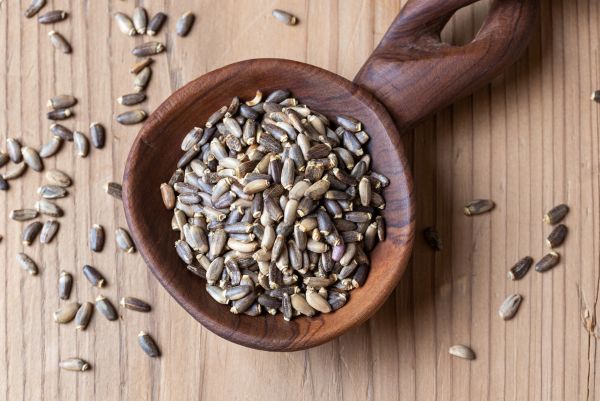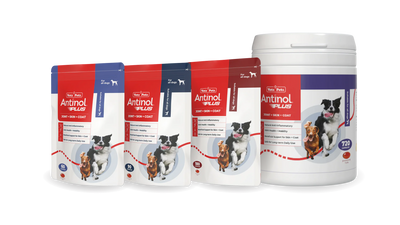How it Can Support Your Dog’s Liver Health
Throughout history, Milk Thistle has been revered for its efficacy in treating various liver and gallbladder disorders. Today, its potential extends beyond traditional use, showing promising benefits for both human and pet health.
Join us as we explore the fascinating world of Milk Thistle and its potential benefits when used in both human and canine wellbeing regimes.
For reference in this article, we use our dog-specific, alcohol-free Pure Milk Thistle extract when discussing dosing and practical use.
What is Milk Thistle?
Milk Thistle is a herb, with the botanical name of Silybum marianum, and is part of the plant Asteraceae family. This family includes other plants such as Ragweed, Daisies, Marigolds, and Chrysanthemums.
This remarkable herb also goes by various aliases such as Mary's Thistle, St. Mary's Thistle, Holy Thistle, and Our Lady's Thistle. The common names originate from a legend related to the white veins on the leaves of the plant triggered by the breast milk of Mary, the mother of Jesus Christ. An interesting bit of folklore, but this astounding herb's benefits on the liver are no myth.
How does Milk Thistle support liver health?
Traditionally, Milk Thistle has primarily been used to treat a range of liver and gallbladder disorders such as hepatitis, fatty liver disease and cirrhosis, and to protect the liver against poisoning from chemical and environmental toxins, including snakebites, insect stings, mushroom poisoning and alcohol.

Milk Thistle as an Antioxidant and its Anti-inflammatory Properties
Milk Thistle acts as an antioxidant, shielding against free radicals that are created by the metabolism of toxic substances such as alcohol and paracetamol. It also increases the activity of enzymes protecting our cells and imparts anti-inflammatory properties by regulating compounds called cytokines responsible for triggering inflammation. Intriguingly, it works in a similar fashion as prescription non-steroidal anti-inflammatory drugs.
The Antifibrotic Properties of Milk Thistle
This herb can likewise prevent collagen fibres deposition in the liver, slowing the progression of liver injury, contributing to its potential as an antifibrotic agent. In addition to helping prevent or at least slow down tissue scarring, Milk Thistle also stimulates the process by which cells make proteins - essential for repairing and replacing cell tissues, making it particularly useful in repairing damaged liver tissue.
The Antitoxin Effects of Milk Thistle
However, one of our favourite features about Milk Thistle is its antitoxin effects. It helps regulate the permeability of the cell membrane and inhibits toxins and viruses from entering and harming the cells. This is especially significant considering our inevitable exposure to environmental toxins.
A good example of Milk Thistle's antitoxin effect can be seen in relation to poisonous mushrooms. You may be aware of the death cap mushroom and that it produces a toxin that is deadly if you ingest it and you're not treated quickly.
Interestingly, one study, which reviewed hundreds of documented cases of death cap mushroom poisoning, found that the overall mortality or the death in patients treated with Milk Thistle was less than 10% - in comparison to more than 20% if patients were only treated with penicillin. Equally, additional case studies have shown that if Milk Thistle is given within 48 hours of poisoning, only mild to moderate liver injury is observed. But if left untreated for more than 48 hours without Milk Thistle, severe liver damage, coagulation disorders, coma and death are likely to occur.

Liver Health and the Environmental Toxin Burden
The importance of liver health cannot be exaggerated enough, as it plays a crucial role in digestion, nutrient synthesis, and blood regulation. Among its myriad functions, the liver acts as a vital filter, removing toxins and harmful substances from the bloodstream. This is particularly pertinent for our canine companions, who face an escalating exposure to environmental toxins.
Indeed, recent studies have revealed alarming levels of industrial chemicals in the blood and urine of pet dogs, surpassing those found in humans. From Teflon residues to plastic softeners and fire retardants, these toxins lurk in everyday items like food packaging, household furniture, and grooming products, posing a significant threat to canine health.
This heightened chemical burden faced by pets is largely attributed to their proximity to ground-level pollutants and industrial chemicals. Recognising this, it becomes imperative to incorporate natural remedies like Milk Thistle into holistic health routines, specifically due to how it can benefit both humans and our animal companions in helping to protect against the effects of these environmental toxins.
Why Give Your Dog Milk Thistle?
For both us and our dogs, the liver performs hundreds of vital functions constantly, helping in the digestion of food and both the breakdown and creation of nutrients; it also regulates blood sugar levels, produces albumin and bile, regulates amino acid levels, regulates blood clotting, and stores vitamins and minerals.
However, one of the most crucial roles it plays, specifically in relation to our dogs, is that it filters all of the blood in the body removing toxins, metabolic by-products, bacteria and other harmful substances from the body.
As mentioned, our dogs are exposed to much higher levels of chemical contaminants on a daily basis than us humans. To expand on the study cited earlier, the study conducted by the Environmental Working Group tested the blood and urine of pet dogs and cats and found that they were contaminated with dozens of industrial chemicals, with 43 chemicals at levels higher than those typically found in people.
The most prevalent chemicals detected were those from the Teflon family, plastic softeners, stain-proofing chemicals and fire retardants. These are most commonly found in food packaging, foam bedding, stain-resistant household furniture and carpets, contaminated house dust, non-stick Teflon pans, shampoos, and plastic dog food bags, containers, bowls, and toys.
Of the 35 chemicals identified in dogs:
- 11 are known carcinogens
- 31 are toxic to the reproductive system, and
- 24 are neurotoxins
Sadly, the situation was even worse for cats. But what the study highlighted was the huge toxic burden that our pets are dealing with.
In addition to toxins, other factors that can contribute to poor liver health or liver disease in dogs include:
- Genetics – some dogs may have a genetic fault that predisposes them to developing liver disease.
- Breed – certain breeds, including Cocker Spaniels, Dobermans and Yorkshire terriers are prone to developing liver problems such as hepatitis.
- Infections – viral, bacterial and fungal infections can all lead to the development of liver disease.
- Regular prescription medications or drugs such as phenobarbital used longterm for dogs with epilepsy.
All of these factors combined indicate a significant need to supplement our dogs’ wellbeing regimes with solutions to support liver health and function.

How to Use Milk Thistle for Dogs
If you’re considering incorporating Milk Thistle into your dog’s health and wellbeing regime, we would suggest reviewing the following steps to ensure complete safety:
- Consult with a qualified professional: Before administering any Milk Thistle to your dog, it's best to consult with a qualified professional such as a holistic veterinarian. They can provide personalised advice based on your dog's health status, size, and any existing medical conditions.
- Choose quality supplements: Opt for high-quality Milk Thistle supplements specifically formulated for dogs, such as our Pure Milk Thistle. Ensure that the product is free from additives or fillers that could be harmful to your pet.
- Determine appropriate dosage: The dosage of Milk Thistle for dogs can vary depending on factors such as weight, age, and health condition. Follow the recommended dosage provided by your veterinarian, or reach out for our support if using CanineCeuticals Pure Milk Thistle.
- Administer with food: Milk Thistle supplements are often available in capsule, tablet, or liquid form. Mix the recommended dosage with your dog's food to make it easier for them to consume.
- Monitor for side effects: While Milk Thistle is generally considered safe for dogs, some may experience mild side effects such as gastrointestinal upset. Monitor your dog for any adverse reactions and consult with a qualified veterinarian if you have any concerns.
- Use as part of a comprehensive treatment plan: Milk Thistle should be used as part of a comprehensive plan for liver support or detoxification. It is not a substitute for veterinary care, especially in cases of serious liver disease.
- Regular monitoring: If your dog has liver issues or is being treated with Milk Thistle for liver support, it's essential to regularly monitor their liver enzymes and overall health status with a qualified holistic veterinarian.
- Be patient: It may take time to see noticeable improvements in your dog's liver health when using Milk Thistle. Be patient and consistent with supplementation as part of your dog's healthcare routine. As a general guideline, allow about 8 weeks from commencement before re-testing liver enzymes.
- Store properly: Store Milk Thistle supplements in a cool, dry place away from direct sunlight, and observe the expiry date to ensure potency and effectiveness.
How We Recommend Using Milk Thistle
Unlike many herbal tonics, CanineCeuticals Pure Milk Thistle has the benefit of tasting good and dogs require only a small volume to be added to their food. And because it's in liquid form, it’s incredibly easy to mix into their meals.
We would recommend incorporating Milk Thistle into your dogs regime if you:
- Live near a busy road
- Walk your dog regularly in council-managed parks
- Live somewhere that used to be farming land
- Have new furniture, new carpet or you’ve recently painted your house
As all of these situations are likely to expose your dog to environmental toxins. For instance, your dog may be exposed to particulate matter from car exhausts, herbicides are regularly sprayed in public parkland areas, farmland is usually heavily contaminated with a range of persistent chemicals in the soil, and new furniture and carpet are likewise full of chemicals.
Equally, if you use monthly or 3-monthly flea and tick treatments, we would again recommend giving Milk Thistle for at least a few days to a week after treatment. Or if you’re feeding a commercial kibble, we would again recommend giving your dog Milk Thistle regularly.
The good thing is that you can change the dose of Milk Thistle as needed. So if you want to use it preventatively or to help support your dog due to low level, unavoidable environmental toxins, you can give a lower dose once a day. But if you have a dog with a diagnosed health condition, you might give a higher dose twice daily.
There are no hard-and-fast rules when it comes to dosage, as it really does depend on the individual dog and the environment it’s in. For instance, you could give it for one week of every month and your dog would still benefit.

Safety
While Milk Thistle is largely recognised as safe with minimal side effects, it's always wise to consult a qualified professional before use. Especially if you or your pet have pre-existing conditions or are on other medications.
Human research has shown Milk Thistle to be safe and without adverse side-effects, even when used long-term, for up to 41 months.
If your dog has diabetes and is on insulin, you will need to use Milk Thistle with caution, since it might lower blood sugar further.
Milk Thistle may cause an allergic reaction, but this is more common in individuals who are allergic to other plants in the Asteraceae family, such as ragweed, daisies, marigolds and chrysanthemums.
For individuals with existing gallstones, caution is advised as the increased bile production may trigger a gallbladder attack.
A lot of references state that no adverse effects are expected in pregnancy and lactation, but we would still advise against it, unless under professional supervision.
In Conclusion
From protecting the liver from exposure to toxic drugs, to reducing cholesterol levels, and improving digestion and nutrient absorption, Milk Thistle offers a host of health benefits and truly stands out as the heart of liver care.
Whether it's for you or your pet, this outstanding herb might be a key addition to your wellbeing regime to support your or your canine companion’s liver health.
If you have any questions about how you might use Milk Thistle for your dog, please email us at info@canineceuticals.com.au.
Prefer to learn by listening? Then check out Narelle's podcast episode on Why we all need Milk Thistle! here.
References available upon request.



